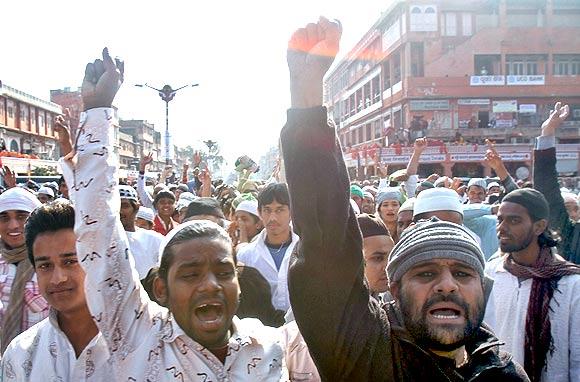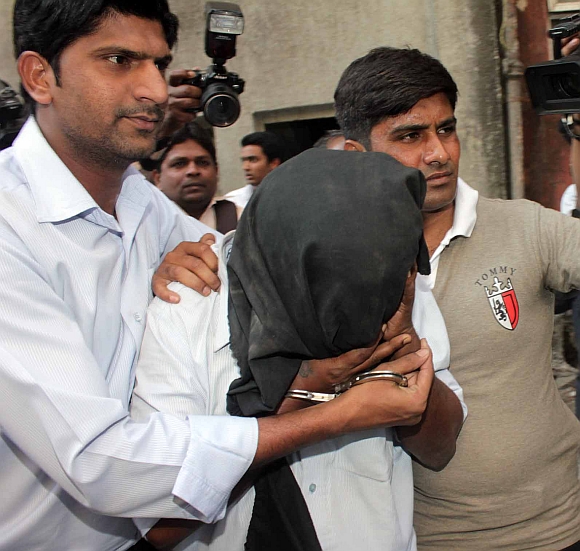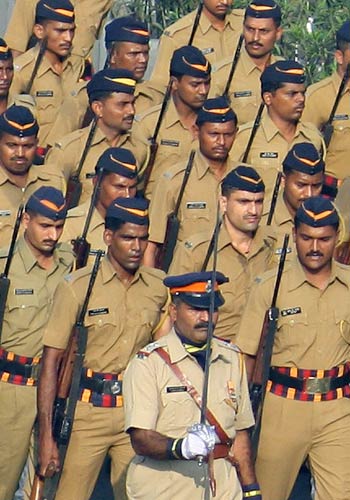Vicky Nanjappa in Bangalore
Trideep Pais, a senior advocate, who used to represent the Students Islamic Movement of India, has also worked with several youngsters who were implicated falsely in terror cases. He explains the nightmare these youngsters go through and how it has become tough for them to cope up with life after spending months in jail for no fault of theirs.
In an interview with rediff.com's Vicky Nanjappa, Pais says that most of the youngsters he has dealt with have started carrying a diary in which they write down what they do through the day so that it can be used as an alibi if they get into trouble with the police.
The government is looking to reimpose the ban on the Students Islamic Movement of India. How do you plan to fight this case?
It is a decision that will have to be taken by the national president of the organisation.
Has the ban on SIMI helped in the war against terrorism?
I do not believe in bans. They do not serve any purpose. If there are crimes, go ahead and prosecute, but banning just does not help. Can you ban someone for their religious beliefs? This is a big question of freedom of conscience.
How else do you deal with terrorism?
We have enough laws to deal with terrorism. We are unable to deal with the problem only because of poor investigation. The manner in which some cases are dealt with is sad. There is no proper investigation and a person is kept in jail, denied bail, until he gets so frustrated that he confesses to an offence he has not committed.
This is not helping the cause. What we need is a political situation and the will to deal with the problem. Moreover, the most important thing is to deal with the case in a proper manner. We need to solve these cases and not only extract confessions forcibly.
The government feels that a ban has helped solve the problem.
That is not the right way to address the problem. Let us not speak about extraterritorial organisations here. Those are not under our control. Out of the 15 organisations that are banned in India, all have been fighting for the local cause. They have a grievance and they tend to take to arms when the government does not listen to them.
Those who have a difficulty with the Indian government cannot be banned, as this is not feasible and does not lead us anywhere. Instead, we should sit across the table and have a discussion and see how the problem can be resolved.
...
'Youth falsely implicated in terror cases have lost faith in the system'
Image: Image for representational purposes onlyThere are nearly 300 youth who have been falsely implicated in various cases of terror. Is there a danger of them taking the extremist path now?
They have come out of jail angry, but they are more paranoid. I have interacted with many of them and they are sad and dejected. There is fear in their minds and they have lost faith in the system, which includes the judiciary. These youth may have come out, but their minds have been scarred forever. The fact of the matter is that they remain on the scanner for the rest of their lives.
How are they coping with it?
It is very sad to see the kind of fear that they live with. These boys carry a diary with them. Right from the time they wake up in the morning to the time they go to bed at night, they make notes of everything they do during the day in their diary. They tell me about these entries and say that this could be their alibi in court. They make it a point to keep everyone informed about what exactly they are doing, so that when a policeman tries to implicate them falsely, they could use it as an alibi.
I know of a youngster who runs a website in his name. Every minute he updates his status only with an intention of telling the rest of the world that he is not up to anything. Even if the police were to think so, the people would stand by him and inform about what exactly he has been doing. Their only motive has become self-preservation.
The way they live today is not normal. They are slow to make friends and anyone who is being generous is looked at with suspicion. Basically, they have lost faith in the system. There is a fear to mix with the general population.
So are you saying that none of the extremists are taking advantage of this situation?
I would not say that this is not fuelling extremism. All I am saying is that the youth that I have dealt with have not gone to the other end. They may have turned to support their community even more today. I can say with confidence that they have not turned to extremism. I have also dealt with cases in which some of them have stopped using smartphones and computers, and even do not use email.
They are so scared that this could be used to implicate them falsely. A client of mine who spent 30 months in jail on a wrong charge won't even use a computer. Even when he goes out of his house, he leaves his cellphone with his wife.
...
'Police need to be educated how to be secular in their approach'
Not a healthy trend for sure. But then how do we deal with the problem?
The solution lies in the manner in which the government acts. On a scale of proportionality, it is the government which is more extremist. If they were not so anti-Muslim this would not have happened. They should be educating the police on how to be secular in their approach.
Which party have you found to be more extremist by nature?
This problem is irrespective of the party in power. With a change in government the perception may change a bit, but the civil servants remain the same. They are the ones who need to be educated.
Which state in your view has dealt with this issue well or in a better way?
It is nothing to do with the state. No state has come up with a fair manner to deal with minorities. However, I would say that Tamil Nadu has done a fair job in this respect, as there are no communal clashes over there. Karnataka and Maharashtra have, however, gone to the other extreme.




article